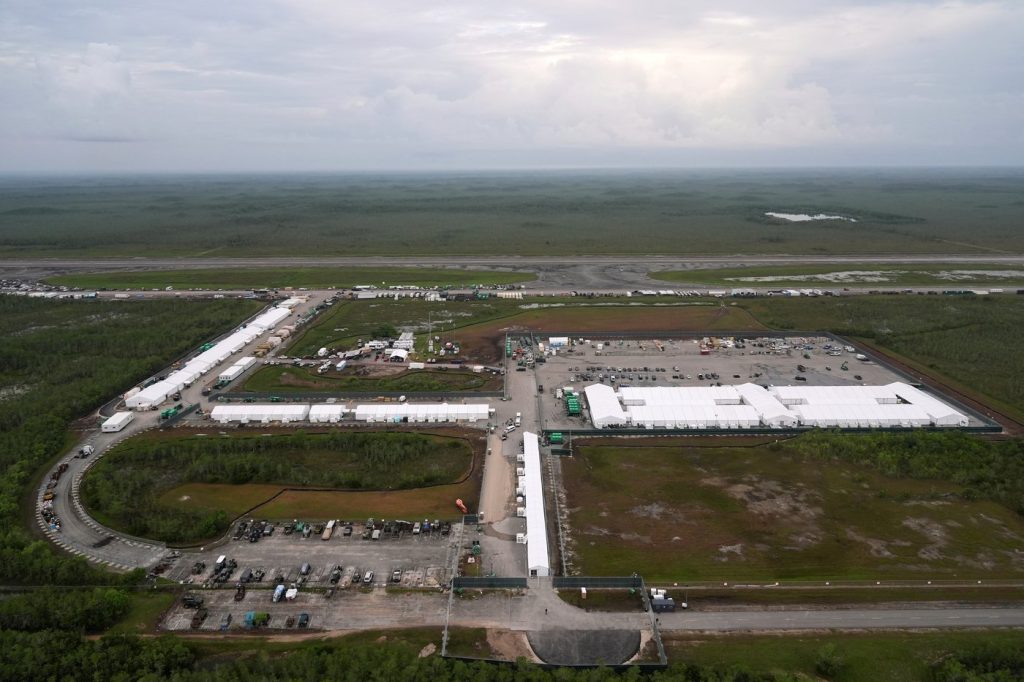ORLANDO, Fla. (AP) – Recently, the federal government requested a judge in Miami to pause her ruling that mandated the winding down of an immigration detention center in the Everglades, known as "Alligator Alcatraz." This request comes in light of ongoing appeals related to her decision.
Attorneys representing the Department of Homeland Security argued that U.S. District Judge Kathleen Williams' ruling would significantly impede the federal government's capacity to enforce immigration laws. They emphasized the need for a swift ruling on their stay request, aiming for a decision by Monday evening.
The legal maneuvering follows a third lawsuit filed by civil rights groups on Friday, which challenges the authority of the state of Florida to operate an immigration detention center. In supporting the stay request, Garrett Ripa, the field office director for Immigration and Customs Enforcement's enforcement and removal operations in Miami, highlighted that the 2,000 beds at the Everglades facility were necessary due to overcrowding in other detention facilities throughout Florida.
Ripa stated, "Its removal would compromise the government's ability to enforce immigration laws, safeguard public safety, protect national security, and maintain border security." This statement underscores the government's rationale for maintaining the facility amid legal challenges.
Environmental groups and the Miccosukee Tribe, which were instrumental in the lawsuit that resulted in the judge's order, opposed the government’s request for a stay. In her order, Judge Williams indicated that the population at the facility could be expected to decrease within 60 days, at which point she directed that fencing, lighting, and generators be dismantled. She also noted that neither the state nor federal defendants could bring additional detainees onto the site besides those currently held there.
The environmental plaintiffs contended that the operations of the detention center violated federal environmental laws and posed a threat to vulnerable wetlands, which maintain protected species of plants and animals. Notably, they argued that further development would undermine decades of environmental restoration efforts worth billions of dollars.
The facility, built within a mere two months at a sparsely used single-runway training airport in the Everglades, has been the subject of significant financial investment. State officials have committed over $245 million in contracts for the construction and operation of the detention center, which opened on July 1.
President Donald Trump visited the facility last month, proposing that it could serve as a model for similar operations nationwide as his administration sought to broaden the infrastructure designated for increased deportations.
In addition to the recent lawsuit filed by civil rights groups, a second lawsuit was filed last month against both state and federal entities concerning practices at the detention center. This earlier complaint charges that detainees were being denied access to necessary legal resources. A federal judge had dismissed parts of this lawsuit but allowed some claims against Florida to proceed in a different jurisdiction.
The newly filed lawsuit describes grave issues at the Everglades facility, including detainees being held for extended periods without any formal charges. Civil rights advocates reported troubling experiences where detainees have seemingly vanished from ICE's detainee locator system. The advocates allege a lack of transparency and access to legal representations, claiming that many detainees cannot connect with their attorneys.
Civil rights attorneys described harsh environmental conditions within the facility, citing problems like flooding, mosquitoes, water shortages, and exposure to harsh weather. Since its opening, at least 100 individuals have reportedly been deported from the facility, with some under pressure to sign voluntary removal orders without the opportunity for legal consultation.
Meanwhile, the administration of Florida Governor Ron DeSantis is preparing to establish an additional immigration detention center, informally referred to as "Deportation Depot," at a state prison situated in northern Florida.











